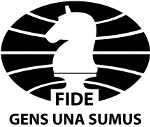Article 8: The recording of the moves
8.1 How the moves shall be recorded:
8.1.1 In the course of play each player is required to record his/her own moves and those of his/her opponent in the correct manner, move after move, as clearly and legibly as possible, in one of the following ways:
8.1.1.1 by writing in the algebraic notation (Appendix C), on the paper ‘scoresheet’ prescribed for the competition.
8.1.1.2 by entering moves on the FIDE certified ‘electronic scoresheet’ prescribed for the competition.
8.1.2 It is forbidden to record the moves in advance, unless the player is claiming a draw according to Article 9.2, or 9.3 or adjourning a game according to Guidelines I.1.1
8.1.3 A player may reply to his/her opponent’s move before recording it, if he/she so wishes. He/She must record his/her previous move before making another.
8.1.4 The scoresheet shall be used only for recording the moves, the times of the clocks, offers of a draw, matters relating to a claim and other relevant data.
8.1.5 Both players must record the offer of a draw on the scoresheet with a symbol (=).
8.1.6 If a player is unable to keep score, an assistant, who must be acceptable to the arbiter, may be provided by the player to record the moves. His/Her clock shall be adjusted by the arbiter in an equitable way. This adjustment of the clock shall not apply to a player with a disability.
8.2 The scoresheet shall be visible to the arbiter throughout the game.
8.3 The scoresheets are the property of the organiser of the competition. An electronic scoresheet with an evident defect shall be replaced by the arbiter.
8.4 If a player has less than five minutes left on his/her clock during an allotted period of time and does not have additional time of 30 seconds or more added with each move, then for the remainder of the period he/she is not obliged to meet the requirements of Article 8.1.1.
8.5 Incomplete scoresheets:
8.5.1 If neither player keeps score under Article 8.4, the arbiter or an assistant should try to be present and keep score. In this case, immediately after a flag has fallen the arbiter shall pause the chessclock. Then both players shall update their scoresheets, using the arbiter’s or the opponent’s scoresheet.
8.5.2 If only one player has not kept score under Article 8.4, he/she must, as soon as either flag has fallen, update his/her scoresheet completely before moving a piece on the chessboard. Provided it is that player’s move, he/she may use his/her opponent’s scoresheet, but must return it before making a move.
8.5.3 If no complete scoresheet is available, the players must reconstruct the game on a second chessboard under the control of the arbiter or an assistant. He/She shall first record the actual game position, clock times, whose clock was running and the number of moves made/completed, if this information is available, before reconstruction takes place.
8.6 If the scoresheets cannot be brought up to date showing that a player has overstepped the allotted time, the next move made shall be considered as the first of the following time period, unless there is evidence that more moves have been made or completed.
8.7 At the conclusion of the game both players shall indicate the result of the game by signing both scoresheets or approve the result on their electronic scoresheets. Even if incorrect, this result shall stand, unless the arbiter decides otherwise.
